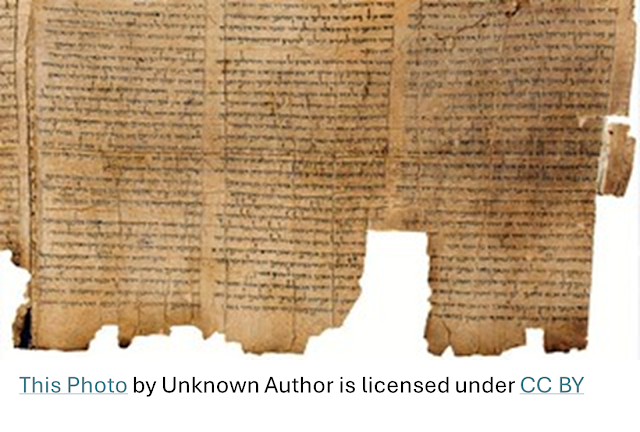LEARNING HEBREW IN MELTING-POT-LAND by Bobbie Ann Cole
Did you know that the discovery of the Dead Sea Scrolls coincided exactly with the United Nations vote to create a sovereign State of Israel— November 30, 1947? More than 90% of the scrolls that have been discovered, comprising of secular documents and everyday invoices as well as holy writings, are in Hebrew.
THEY ALWAYS SPOKE HEBREW
This confirms that Hebrew was the language of
the Holy Land in Jesus’ time.
It became the official first language of
Israel on Independence Day, May 14, 1948.
Immigrants from Morocco, Russia, France,
Spanish-speaking countries, Ethiopia and all over the world need to learn it: they
receive free training.
I am a linguist, yet I have not found Hebrew to be a walk in the park by any means. Apart from the obvious different alephbet, written back-to-front (i.e. right-to-left) and without vowels, it is a semitic language more closely related to Arabic than to any European language.
BEAUTIFUL AND ECONOMICAL
I find it beautiful and economical but
almost every word has to be committed to memory. It is unlikely to be related
to any I know.
Example: מדבר – (MDBR) this could be medaber – I speak (masculine
singular) or midbar – desert.
Likewise, the grammar, though elegant, is
far from obvious.
Example: אני בבית מלון – (ani b’bait mahlon) I am at a hotel. They don’t
bother with the verb ‘to be’ so the ‘am’ is understood. They attach
the ‘at’ - ב – to the noun. That don't bother with the 'a'. And the hotel – ‘bait mahlon’
or ‘house of hotel’ is not connected to any expression I might be familiar with
in English, French or German.
IT COULD HAVE BEEN YIDDISH
It didn’t always appear that Hebrew would
become Israel’s national language. This is largely due to the effort and
commitment of Eliezer Ben Yehuda who created the first modern Hebrew dictionary
in the late 19th century.
There was opposition from religious sects who considered Hebrew, the language of Torah, too holy to be casually spoken. One time, Ben Yehuda’s son was heard at play talking to the family dog in Hebrew. Some religious were so outraged that they killed the dog!
Some early immigrants from Eastern Europe
considered that the national language of Israel should be Yiddish, a predominantly German
dialect. This did not suit the many Sephardi Jews, (of ‘Spanish’ origin).
HAD TO BE HEBREW
Only Hebrew could unite the Jews who had
lived in exile in the four corners of the world for almost 2,000 years, since
the time of the destruction of Herod’s Temple and the Sack of Jerusalem, (AD
70).
Many Israelis today speak more than one language.
You can get by almost everywhere with English. Public transport and road signs
are in three languages: Hebrew, Arabic and English.
People also speak the language of the
countries they have left behind— Russian and French currently predominate.
JEWISH STUDIES MA
Modern Hebrew is a requirement of my Jewish
Studies MA at the Hebrew University of Jerusalem. I had to duck out of classes,
however, as the requirements of long hours of online learning, along with
homework, prevented me from giving any time to my core modules.
I am pleased to say we are back to live
learning after three months of online classes at the start of the war. I hope
to be taking Hebrew back up soon. I currently speak like a five-year old. (with
the vocab of a 2–3-year-old, actually.)
Bobbie Ann Cole is a Christian author, speaker and teacher, currently living and studying in Israel. Keep up with her blog posts and newsletters about her life in the Holy Land by signing up at http://scrollchest.com. You will receive her 5-Minute Testimony, HOW I MET JESUS: “It happened seventeen years ago, in a Jerusalem church where, as a Jew, I thought I wasn’t supposed to be.”





Fascinating.
ReplyDeleteI love learning languages! I had some Hebrew classes, going along with friends. At that time I still had three sugars in my coffee and had to get creative at the coffee break, as my friends didn't know the word...!
ReplyDeleteThis would be coffee with sugar: kafey im zukar - very similar to English, which is exceptional: קפה עם סוכר
DeleteThis is really interesting, Bobbie. I didn't realise that the founding of the Dead Sea Scrolls coincided with the UN vote to establish a state of Israel. I have just been studying a course called Israel-Palestine, and have learnt so much about the history of this troubled area. Illuminating.
ReplyDeleteThank you, Sheila. I am glad that you found it enlightening.
DeleteLovely post, Bobbie, thanks. Your first question is exactly what every writer looks for in their opening sentence in writing: A hooker! What an amazing discovery and coincidence!! Thanks for sharing your learning and historical facts of our beloved Lord's culture and background. I always look forward to your posts. Very educating and informative. Wishing you God's continued favour and grace in your studies. Blessings.
ReplyDeleteI had long wondered why Jesus seemed to be using Hebrew with "Eli, Eli lama sabachtani" and "Talita kumi" etc. Now I am convinced it was a form of Hebrew.
DeleteThank you Bobbie for the stimulating and informative posts. It is good to learn so much more about Israel and link it to biblical knowledge. i really enjoy the way you link your own experience to sources and background information. Good examples and also inspiration for thinking what other ways we might present information or stories.
ReplyDeleteThank you for your encouragement, Claire. I really love immersing myself in Jesus' world.
DeleteI can appreciate the challenges of learning Hebrew--having taken formal classes as part of my grad studies in Toronto. God bless you as you continue on this marvelous journey!!!
ReplyDeleteשפה קשה מאוד
Delete